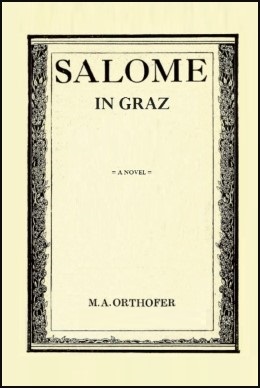A
Literary Saloon
&
Site of Review.
Trying to meet all your book preview and review needs.
| Main |
 |
| the Best |
| the Rest |
| Review Index |
| Links |




to e-mail us:

A Literary Saloon and Site of Review
Salome in Graz
Salome in Graz has more than its fill of quotes -- hundreds of them ! -- but (at least) the various sections and chapters don't come with epigraphs as well: there's just one short one, for the book as a whole:
Our tale, O our oracle !
That's from Gerard Manley Hopkins -- from Spelt from Sibyl's Leaves, as you'll have recognized (or can quickly Google).
It -- and the poem -- are not directly Salome-related -- intentionally so. As with the cover, any specific Salome-related-quote would have been too specific and limiting. And, after all, readers will soon find that a great deal that has been said and written about Salome is said (and quoted) in the novel itself.
Nevertheless, the epigraph, as is, is certainly appropriate for the novel -- indeed, a kind of summing-up.
It also complements the text in a number of additional ways. Completed in 1886, 'Spelt from Sibyl's Leaves' is of nearly the same time as the Wildean Salome that is so central to the novel. Hopkins' insistence that the sonnet is: "made for performance and that its performance is not reading with the eye but loud" and that: "This sonnet shd. be almost sung" nicely dovetails with the questions/issues surrounding the nature of Wilde's text (and Strauss' opera) that are addressed in the novel, too.
Several other lines from the poem are fitting as well, such as:self in self steeped and pashed — quiteAnd while Marguerite and the narrator are not diametrically opposed -- "black, white; right, wrong" -- the rest of the closing lines mirror, in no small part, the presentation of the novel, the two figures like the 'two spools':
Disremembering, dismembering all now.reckon but, reck but, mindBeyond that, Hopkins' language-excess of course appeals to both main characters (though fortunately they themselves do not (overly) indulge in similar wordplay in the narrative ...); even if Hopkins had not been the source of the novel's epigraph, a (no doubt well-worn) collection of his poems would still have featured in the Bibliography.
But there two; ware of a world where but these two tell, each off
the other; of a rack
Where, selfwrung, selfstrung, sheathe- and shelterless,
thoughts against thoughts in groans grind.
Bonus clarification: a connection that should not be made is to Hopkins' Spring and Fall: 'Marguerite' is not named for the figure in that poem (if she were, she'd be named 'Margaret' outright, for one); indeed, the novel's Marguerite seems unlikely to be able to relate to that poem (unlike 'Spelt from Sibyl's Leaves') in any way. (The narrator, on the other hand ....)
(Bonus clue: Marguerite's name is taken from a literary source -- and the work in question is included in the Bibliography, and there's a small flutter of a clue to it in the novel's opening chapter.)
- Return to top of the page -
- More about: Salome in Graz -
Main | the New | the Best | the Rest | Review Index | Links



